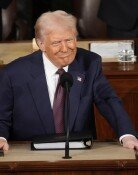Ruling party's Lai Ching-te wins Taiwan's presidential election
Ruling party's Lai Ching-te wins Taiwan's presidential election
Posted January. 15, 2024 07:33,
Updated January. 15, 2024 07:33
The Taiwanese presidential election, which gained global attention as a proxy war between Washington and Beijing, ended with the victory of Lai Ching-te of the Democratic Progressive Party, a pro-American and pro-independence party. The presidential elect earned 40.1 percent of the counted votes on Saturday, surpassing two other competitors - Hou Yu-ih, a pro-China candidate of the main opposing Kuomintang (33.5 percent) and the second largest opposing Taiwan People's Party’s Ko Wen-je (26.5 percent). Amid China’s military pressure, Lai broke the so-called eight-year curse in Taiwanese politics, where no party had ever stayed in power for more than two presidential elections and took the helm of the nation, saying, “Taiwanese people have brought victory to the world’s democratic bloc in the first presidential election of this year across the globe.”
The results of Taiwan's presidential election are attributable more to the opposing parties’ failure to join forces rather than to the great public support of the ruling party. After all, it was an unprecedented case where Lai failed to gain the majority of the counted votes. Added to this, the ruling Democratic Progressive Party was outnumbered by one seat by the main opposition, Kuomintang, which consequently claimed the title of the largest single party following the legislative election held on the same day.
As a result, Northeast Asia has been left with more significant uncertainty since the Taiwanese presidential election. A path not walked lies ahead of Taiwan as the presidential elect gained less than 50 percent of the counted votes and the ruling party failed to take up the majority of the legislative body. Moreover, the elect is closer to Washington and shows stronger support for Taiwan’s independence than the incumbent Taiwanese president. This may increase the chances of Chinese President Xi Jinping raising military tension targeting Taiwan as he looks for an opportunity to solidify domestic unity amid the slowing economy.
Inevitably, South Korea will not have much room for maneuver if the relations between Taiwan and China get tense. When it handles issues concerning Taiwan, which Beijing considers one of its core national interests, Seoul’s highest-ranking officials are not supposed to be so focused on the significance of its alliance with Washington that it will end up being careless with their choice of words. It should not repeat the mistake made when its remarks “against military action” left China upset earlier this year. On the other hand, the South Korean government must prepare for the possibility that Donald Trump, who has hinted that he would not help defend Taiwan from China, will return to the White House in the U.S. presidential election this November.
The growing tension between Taiwan and China may lead to another nightmare for the global economy, which is already struggling amid the wars happening in Ukraine and the Middle East. Taiwan is home to the world's largest foundry, TSMC, and the Taiwan Strait serves as a maritime channel for half the world's container ships. If China implements a stringent limit on the export of minerals, which are crucial to Taiwan's semiconductor industry, South Korean businesses will likely suffer risk across their supply chains. The changes in the U.S.-China and Taiwan-China relations do not necessarily translate into challenges. Specifically, Samsung Electronics will likely seize an opportunity to make strides in the global market with TSMC left off its guard. Indeed, it is becoming more critical now than ever to show diplomatic capabilities to handle geopolitical risks and discover opportunities.







